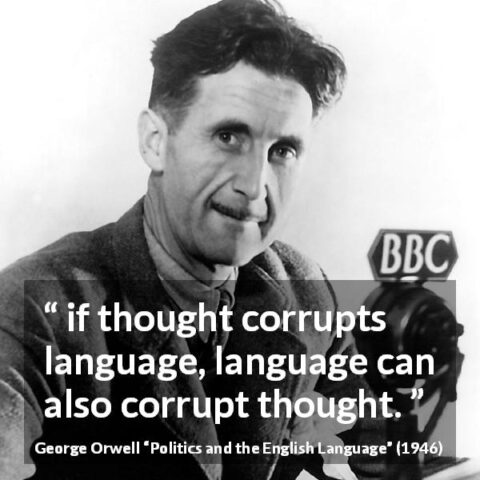Andrew Sullivan on how our language keeps changing, top-down, whether we want it or not, from 9/11 through to tomorrow:
It was during the war in Iraq that Orwell’s insistence on clear language first came roaring back. This time, the newspeak was coming from the neocon right. We heard the term “enhanced interrogation techniques” to describe what any sane person would instantly call “torture”. Or “extraordinary rendition” — which meant kidnapping in order to torture. There was “environmental manipulation” — freezing naked human beings to near-death and back again. All the terms followed Orwell’s rules for new words “needed if one wants to name things without calling up mental pictures of them”. All the new terms were opaque and longer than the original.
And then, in the era of “social justice”, the new words began to come from the far left. Words we thought we knew — “queer” for example — were suddenly re-purposed without notice. Gay men and lesbians, with our very distinct experiences, were merged into a non-word, along with transgender people: “LGBT”. That was turned into “LGBTQIA+” — an ever-expanding acronymic abstraction that, in Orwell’s words, “falls upon the facts like soft snow, blurring the outlines and covering up all the details”.
Orwell’s insight was that these terms are designed to describe things you want to obscure. Hence one of his rules: “Never use a foreign phrase, a scientific word or a jargon word if you can think of an everyday English equivalent.” Writing the English that people speak every day is essential for a flourishing democracy.
Which brings me to that old English term “sex change”. Everyone instantly understands it. Which is, of course, precisely the problem. So now we say: “gender-affirming care”. Or take another word we all know: “children” — kids usually up to puberty. Also way too understandable. So “sex changes for children” suddenly becomes “gender-affirming care for minors”. These are the words, again, that are “needed if one wants to name things without calling up mental pictures of them”.
Or take the term “transgender” itself. Remember when it was “transsexual”? Or when “sex” was first distinguished from “gender” — and then replaced by it? The usual refrain is that “the community” switched the terms, which means to say that a clique of activists decided that gender would be the new paradigm, and include any number of “queer” postmodern identities, while sex — let alone “biological sex” — was to be phased out and, with any luck, forgotten. Now notice how the new word “transgender” has recently changed its meaning yet again, and now includes anyone, including straights, outside traditional gender roles — whatever those are supposed to mean.
Or check out the new poll from the Washington Post yesterday, in which a big majority of transgender people do not consider themselves either a “trans man” or a “trans woman” at all. They prefer “nonbinary” and “gender-nonconforming” — and distance themselves from both sexes. Less than a third physically present as another sex “all the time”. The vast majority have no surgery at all.
Now read Masha Gessen’s recent interview with The New Yorker, and get even more confused. Gessen denies that transness is one thing at all. S/he says it’s a different thing now than it was a decade ago, and that “being transgender in a society that understands that some people are transgender is fundamentally different from being transgender in a society that doesn’t understand”.
S/he says that there are “different ideas about transness within the trans community … probably different trans communities”. S/he denies a “single-true-self narrative” as some kind of anchor for identity. S/he believes that transitioning can be done many times, back and forth: “Some people transition more than once. Some people transition from female to male, and then transition from male to female, and then maybe transition again.”
If gender is entirely a social construct, with no biological character, why do transgender people want hormones — an entirely biological intervention? Because “being trans is not a medical condition, but it marries you for life to the medical system”. Huh? By the end of the interview, you get the feeling that trans is whatever Gessen bloody well wants it to be, and yet at the same time it remains beyond interrogation.




